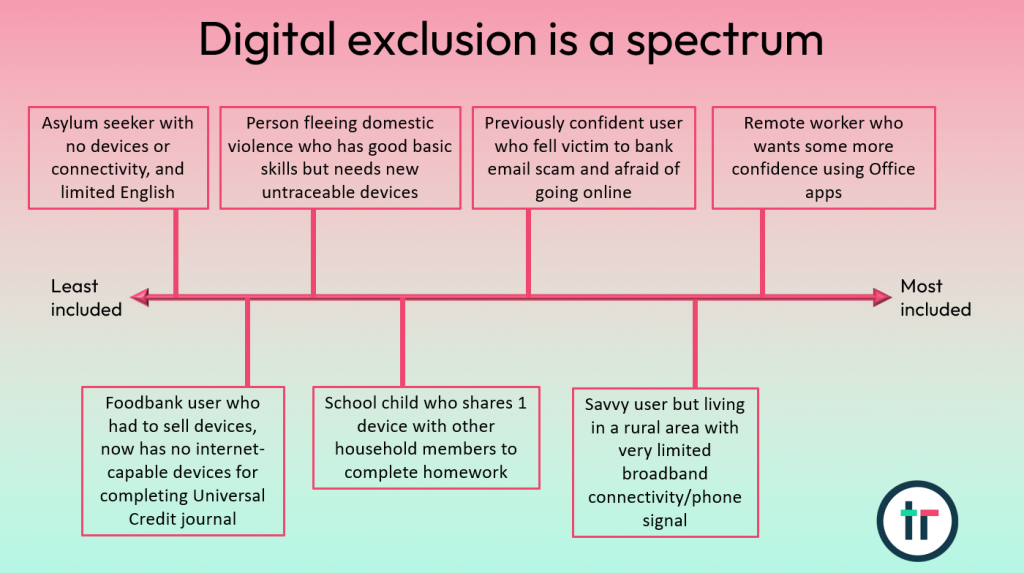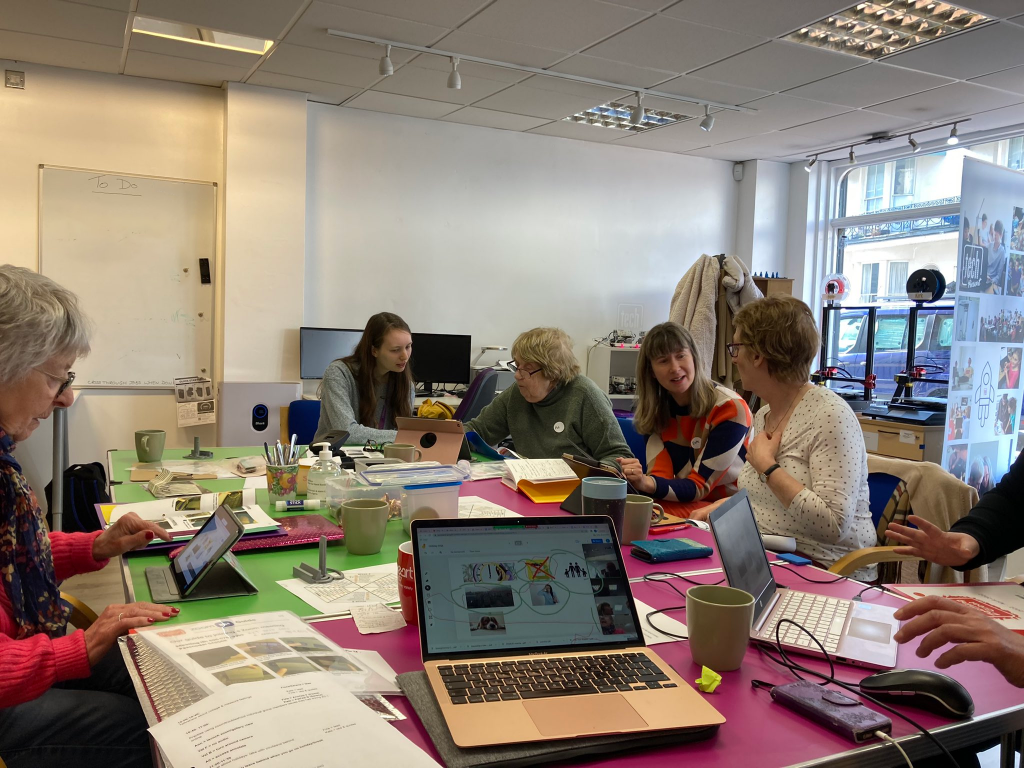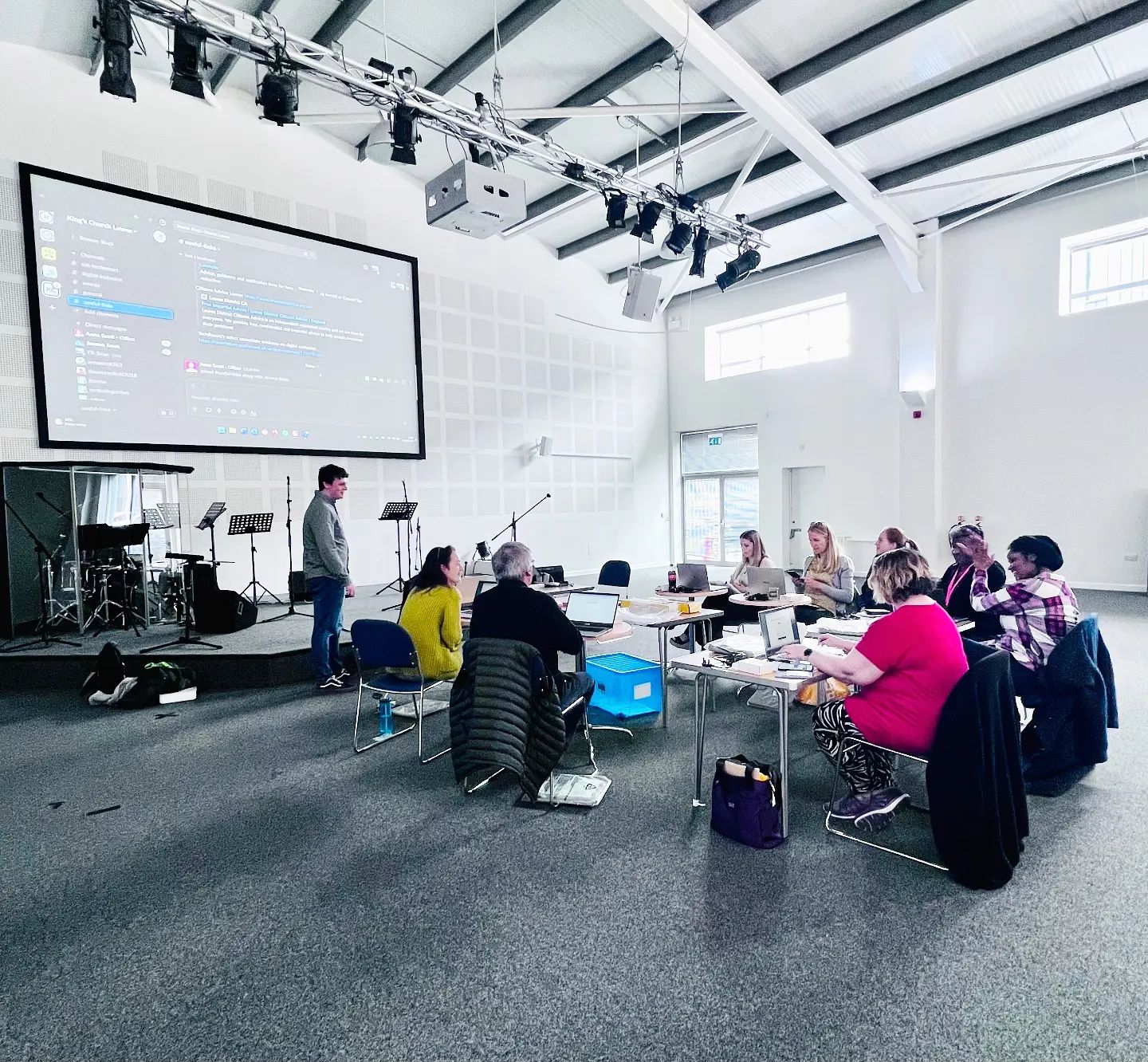Today, Tuesday 12th September, is End Digital Poverty Day. This is an initiative from the excellent Digital Poverty Alliance team, who, like ourselves, work to tackle digital exclusion.
Access to a device and the internet is no longer a “nice to have”, but an everyday essential. More services are moving online, and those who are not able to get (or stay) connected are being left behind.
We see this every day.
As the only digital inclusion specialist in East Sussex, we’re running up to 5 digital drop-in sessions each week throughout the county, and now averaging around 60 client visits each month.
In addition, we’re continuing to provide refurbished devices for people who have no other means of getting online.
Our base in Eastbourne is, unfortunately, in one of the most deprived neighbourhoods in the country. Eastbourne Foodbank is the busiest in the country per capita. Working with clients we see first hand how digital poverty underpins and exacerbates other forms of poverty.
What is digital exclusion?
People who are digitally excluded will find it significantly harder to stay in touch with support networks and loved ones, access healthcare services and fulfill requirements like Universal Credit journals. For people searching for jobs, 92% of jobs are now advertised exclusively online.
Digitally excluded people are also likely to end up paying around £200 per year more for their bills.
Sometimes digital exclusion is misunderstood as being mainly restricted to older people not happy to use ‘new-fangled’ tech when traditional methods are more personal and understandable.
The reality is a far more complex picture. Among the digitally excluded there are refugees, Foodbank users, rough sleepers, young parents, domestic abuse survivors, schoolchildren and more. These groups have so many other, complex challenges in their lives that, even discounting the enormous cost barrier, getting online is never going to be their top priority, yet being digitally included can make solving some other issues significantly easier.
Digital inclusion requires, generally speaking:
- Regular access to suitable devices
- Reliable connectivity
- Confidence and skills to use devices independently
Exclusion is a spectrum – someone is not suddenly digitally included because they attended one class, or were donated a device. It takes time and frequent small interventions to gradually build confidence.

Increasingly, as a result of the cost of living crisis, people are having to choose between their connectivity, food, fuel, and rent. The challenge is not going away any time soon.
Our approach
We recognise that becoming digitally included is rarely top of anyone’s to-do list but asking for help can be quite daunting.
We work to remove as many barriers as possible to make it as easy as we can:
- our drop-ins are free to access
- our base is in a shop in a busy street, in the heart of our communtiy
- we give everyone a smile and a warm welcome
- we work in an informal environment
- we provide flexible help based on what people want or need to learn right now
We hope to make it more likely people will return to develop their digital skills.
It’s easy to forget how some skills we might take for granted will be daunting for other people – and how overwhelming learning new things or carrying out time-sensitive online jobs can be. We always work at the pace of each learner – and we’re very careful to ensure we explain things carefully, avoiding jargon.
Some of our staff have a technical or computing background – but not all. Being able to sit next to somebody, listen, and work through a problem together with just a bit of underlying knowledge is what makes a great helper. Indeed, many people feel relieved to find out that we as the experts don’t always know all of the answers immediately!
Working together
Because we know that digital poverty is probably not the only challenge people are facing, we’re always aiming to work in a more holistic manner. We work alongside other support organisations to ensure our clients are getting as much help as they can to improve their overall life circumstances.
In practice this sometimes means working closely with other organisations who offer specialist help on debt, benefits, energy, and housing. We make and accept referrals from many different groups. Other times it means taking drop-in sessions out to community venues where people gather for other reasons and making help and information available there.
We’re already doing this throughout the county – most recently, at Bexhill. Every Thursday we sit in a high-street location alongside a social prescriber, Rother District Council’s Housing team, and Citizens Advice. Clients often come in needing one bit of specialist help, and then ask for another. We’re able to refer directly in the room immediately for help – making support easier to access.
One recent visitor came in wanting some help logging in to the NHS app on their phone. While waiting for the app to download, we got talking and they said how lonely they had felt since moving to Bexhill, and how it was impacting their mental health. We were then able to ask the social prescriber to have a chat too, and they were signposted to local groups and mental health services.
Having a multi-agency service on the high street makes it easier for people to simply walk in and get the help they need.
This is just one reason why the excellent recent House of Lords report on digital exclusion stressed the importance of “community-based, locally delivered digital inclusion interventions and partnerships.”
It takes time to get it right, and we’re always keen to forge new partnerships, or help other groups set up their own digital inclusion schemes. Both King’s Church, Lewes and Hastings HEART have launched their own “Digi Hub” after some initial training and advice from us, and now they’re able to offer digital support in their area as well as wider support to members of their communities who need it.
We’d love to see more organisations come to us for help so we can tackle digital exclusion, together. Please do get in touch.
Thank you to Digital Poverty Alliance for establishing the ‘End Digital Poverty Day’, and for all of your excellent nationwide efforts to raise awareness of, and tackle, digital exclusion. Their research, reports, and plans always offer valuable insight. It’s fantastic to see how many events, webinars, and drop-ins are running today to help people and highlight the cause – find out more on their website.


